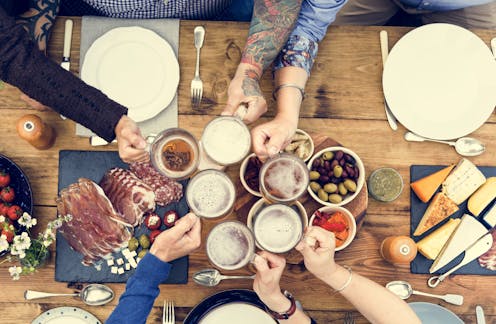What's in a name? Quite a lot if it's prosecco, parmesan or mozzarella
- Written by Steven Greenland, Professor in Marketing, Charles Darwin University

Prosecco might evoke warm summer evenings while prosciutto conjures scenes of generous platters at a casual weekend lunch. But would “sparkling wine” or “thinly sliced ham” have the same impact?
Australian producers would argue they wouldn’t and are fighting a push by the European Union to stop them from using these and other terms which indicate the geographical origin of numerous cheeses, wines and other foodstuffs now widely produced in Australia.
This stoush over using European names for locally made products has stalled this week’s trade talks[1], with the EU refusing Australia better access to their markets unless Australia agrees to rebrand its products.
Prime Minister Anthony Albanese [2]said Australia was keen to conclude the trade agreement but would not sign a deal that wasn’t in Australia’s interests. He is strongly backed by the National Farmers’ Federation and food producers.
So why does Europe want to control the use of food names?
Consumers increasingly want to know their foods’ provenance. They also pay premiums for guarantees about origin and quality. There has been a corresponding rise in so-called geographical indicator registrations, with the 3,500th[3] listed earlier this year.
Items included on the EU Geographical Indications register cover different foodstuffs that are either applying for or have been accepted for having their geographic origin related name protected from being used for similar foods produced elsewhere.
Europe has the highest number of registered products, with most relating to wine, agricultural products and foodstuffs, as well as spirits and beers.
Champagne is among those with a widely recognised connection to its place of origin which assures consumers about the regional and cultural values as well as the products’ characteristics and quality.
Like high value household product brand names (for example, Coca-Cola which has been valued at US $97.88 billion) geographical indication registered names also attract substantial dollar values.
This is because of strong international awareness, familiarity, and appeal among consumers. The geographic indicator name often attracts a price that can easily be double that of a similar but non-registered product.
Registered products can therefore bring in significant revenue to the European Union member countries. They contribute to regional development [5]by stimulating tourism and by helping to reverse population decline often experienced in rural areas.
Like household brands, the names which indicate a product’s origins, are recognised as intellectual property. They have consequently become an integral part of international trade agreements.
What would Australia gain by agreeing to European product names?
In return for complying with European Union demands, Australian producers would gain access to European markets of [445 million people[6]] with a GDP of $24 trillion.
The lost opportunity of non-compliance is best illustrated by Brexit. Since Brexit, UK exports to Europe have fallen[7] and UK farmers have faced significant challenges finding alternative markets[8].
If Australia agrees to the European Union’s conditions to get a trade deal through then producers will need to rename some of their products.
This would be a large and costly exercise but might give local producers an opportunity to capitalise on the growing consumer demand for locally sourced food and promote Australia’s unique geographical brand values.
Recent research conducted by Charles Darwin University reveals some of the unique brand values of Australian agri-food products, including unique selling points of products from the Northern Territory[9].
Selling points included the unique climate, soil and traditional community values as selling points.
Australia’s reputation for quality and ethically produced goods was also important. Such values may lead to Australia developing more of its own geographical indication registration requirements in the future.
Rather than fight the rising tide of European Union registrations, the federal government might embrace the trend, in conjunction with renewed promotion of Australia’s geographical brand benefits.
Should the government choose to comply with Europe’s demands then producers will need support to rebrand some of their products. Government and departments such as CSIRO should be keen to support this as it can only strengthen Australia’s agri-food sector’s international reputation.
References
- ^ this week’s trade talks (www.abc.net.au)
- ^ Prime Minister Anthony Albanese (www.news.com.au)
- ^ the 3,500th (agenceurope.eu)
- ^ www.shutterstock.com (www.shutterstock.com)
- ^ regional development (onlinelibrary.wiley.com)
- ^ 445 million people (www.afr.com)
- ^ exports to Europe have fallen (www.euronews.com)
- ^ alternative markets (www.theguardian.com)
- ^ Northern Territory (researchers.cdu.edu.au)
Authors: Steven Greenland, Professor in Marketing, Charles Darwin University














